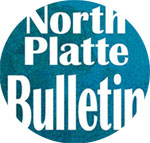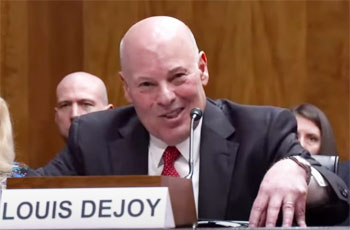On April 16, a U.S. Senator told Postmaster General Louis DeJoy to stop consolidation plans that would truck the mail hundreds of miles around the country to be processed.
Under the plan, mail would make daily trips from North Platte 250 miles to Denver, from Grand Junction, Colo. over the Rocky Mountains to Denver, and from Reno Nev. over the Sierra Nevada mountains to Sacramento, Calif., to name a few of the destinations.
Sen. Gary Peters of Michigan, the chairman of the U.S. Senate Committee on Government Affairs, wants the plan to stop, at least for a few months.
Dejoy and other postal officials appeared before the Senate oversight committee at a special hearing, where committee members asked DeJoy blistering questions.
Under Dejoy’s plan, U.S. mail processing would be consolidated into about 60 mega-centers around the country. The Denver processing center would handle mail from all of western Nebraska, which is now processed in North Platte.
The Denver processing center is also slated to receive the mail from all of Colorado, including the other side of the Continental Divide, as well as most of Wyoming and parts of Kansas, South Dakota, New Mexico and Utah.
Under the plan, the only center that would process mail in Nebraska would be in Omaha, and the Omaha center would also handle mail from large sections of nearby states.
DeJoy says the consolidation would lower operating costs and ensure more mail trucks are full instead of partially full. He says local mail would still be delivered on time, an assertion that makes critics scoff.
The full plan has not been disclosed so the details of the mail’s return trip are vague, but in all likelihood, mail bound for western Nebraska sent from Denver back to North Platte, from where it would be delivered to towns around the western half of the state.
The reorganization plan, which is steadily taking shape around the country, has been far from successful thus far.
In July 2023, the first USPS mega-processing & distribution centers opened in July in Richmond, Va. Since then, costs increased by $8 million, and rather than speeding up mail deliveries, the rate of on-time delivery plummeted.
Within six months after the Richmond center opened, the amount of mail delivered on time in Virginia dropped by half, from 85% to 43%.
Next, the second mega-regional center opened in late February in Atlanta. Mail delays there have been much worse than in Richmond, according to the USPS records and government inspectors.
At the same time, DeJoy quietly relaxed the next-day standard for first-class mail, allowing two days for first-class delivery to nearby mailboxes, such as those within the same city, and allowing 3-5 days in a wider region. Despite the added delivery time, the Atlanta center has only delivered 36% of the mail on time since it opened. In March, on-time delivery there fell to 16%.
Sen. Jon Ossoff of Georgia categorized the Atlanta mega-center as a failure, and told DeJoy that if he doesn’t bring the operation up to expectations in a few weeks, he is unfit to be the U.S. postmaster general.
At the hearing, Sen. Jacky Rosen of Nevada said mail from Reno would be sent to Sacramento, Calif. and back. She noted that I-80 is the only highway that crosses the Sierra Nevada mountains between the two cities, and it goes over the infamous Donner Pass. The pass receives an average of 33 feet of snow in winter. Winds blow up to 100 mph. Last winter, Donner Pass was closed 35 times.
When Rosen asked DeJoy if he knew how often Donner Pass is closed, he said, “Why would I know that?”
“Because you’re the postmaster general,” she replied.
Rosen as well as other senators on the committee said DeJoy has not answered their repeated inquiries about the consolidations nor addressed their concerns.
A senator from California said a post office in her state has been closed for more than a year because a water pipe broke in the building. Instead of fixing it, the USPS brought in trailers, from which the post office has been operating.
A senator from Missouri said a post office in a small town was destroyed by a tornado, and the town has gone without a post office since. Kansas Sen. Jerry Moran said the city of Olathe would like to use part of a post office parking lot that is empty to help their downtown development, and would pay USPS for it, but their inquiries have not be answered.
Senators also voiced concerns about undelivered medicines, undelivered water samples to laboratories, mail-in ballots in the upcoming elections, as well as undelivered priority packages and letters.
At the end of the 2.5-hour hearing, Chairman Peters urged DeJoy to stop consolidating processing centers around the country until the first two mega-centers are up to speed. He also told the Postal Regulatory Commission – the oversight agency – to study the situation and advise Congress and the public about it.
Peters also gave DeJoy two weeks to provide a list of all postal processing centers that would close, be reconfigured, or expand under the plan. And, he asked for the specific timelines, along with a complete report on everything that has changed so far.
“You have a really hard job, delivering to every single address,” Peters told DeJoy. “But we just need more transparency. We want some caution, not just believing that a plan works, but being able to back that up with data. We want more conversation with other stakeholders. We shouldn’t be reckless. We shouldn’t be moving forward before we work out the kinks.”
POSTAL: Bills introduced
The day before the hearing, Rep. Jared Golden of Maine introduced a bill in the House of Representatives to freeze consolidation of mail processing facilities by the USPS.
And soon after the Senate hearing, 22 members of Congress signed a letter to DeJoy and said consolidating distribution and processing centers would “dismantle parts of the Postal Service’s robust network… creating inefficiencies in the system, especially for local mail.”
The letter was led by Sens. Susan Collins of Maine and Joe Manchin of West Virginia.
Also, Rep. Harriet Hageman and Sen. Cynthia Lummis of Wyoming introduced legislation – the Postal Operations Stay Timely and Local (POSTAL) act — to prevent USPS from closing, consolidating, or downgrading its processing and distribution centers nationwide if such an action would remove the sole P&DC within a state or negatively impact mail delivery. The Senate bill is co-sponsored by Sen. John Barrasso of Wyoming and the House bill is co-led by Rep. Chris Pappas of New Hampshire.
Also, Sen. Jack Bergman of Michigan and Rep. Nikki Budzinski of Illinois have introduced another bill, the Protect Postal Performance Act, to bar the USPS from downsizing processing facilities in regions that are failing to meet the USPS delivery targets of 90.3% on-time delivery for 3-5-day first-class mail and 93% on-time delivery for two-day first-class mail.
(The report first appeared in the Bulletin’s April 17 print edition. It has been updated.)
© 2024 The North Platte Bulletin. All rights reserved.
















































When his head was shaved, I think a bucket load of brain went into the trash along with the hair.
JMHO
What a display of gross incompetence. Poor guy should have answered some questions by making farting sounds.